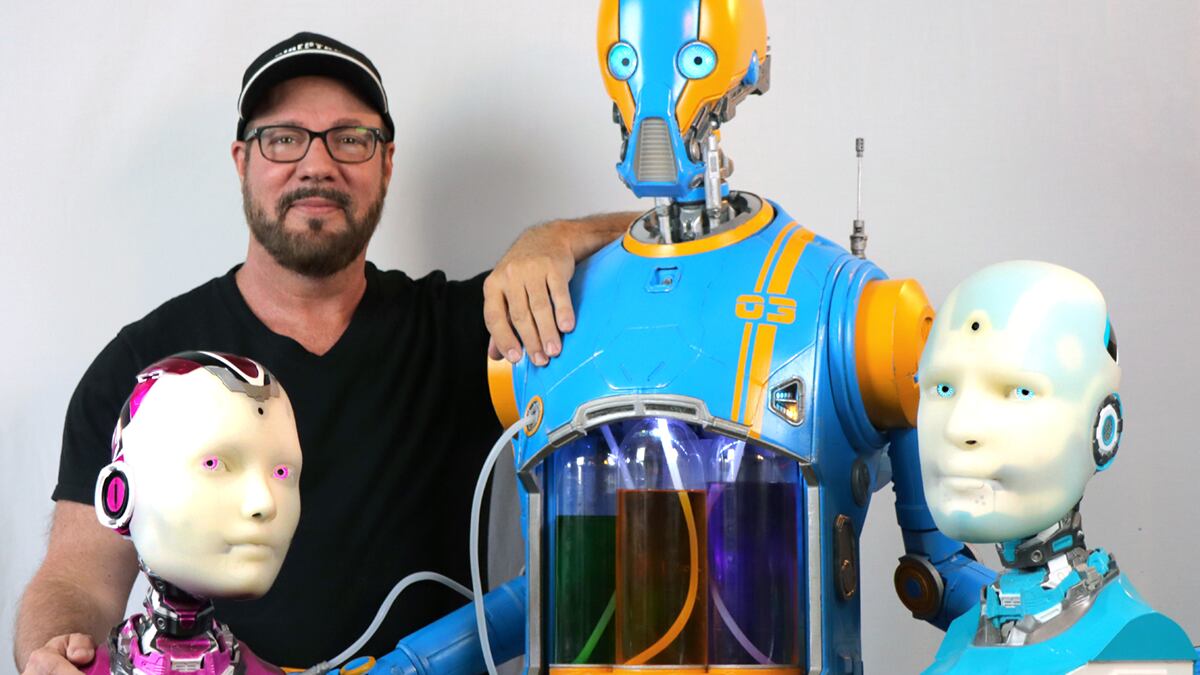Twenty years ago this month, a mother abandoned her android child in the Oregon woods. This heart-piercing act from A.I. Artificial Intelligence (2001)—the sole scene from Steven Spielberg’s film shot in Gresham’s Oxbow Regional Park—sees robot child surrogate David (Haley Joel Osment) left to discover whether the outside world can validate his hardwired ability to love.
Sifting through questions of non-carbon lifeforms’ empathy and agency, A.I. is arguably Spielberg’s deepest film, emotionally and conceptually. And while Wilsonville roboticist Will Huff didn’t work on that particular scene filmed in Oregon (nor did he live here at the time), his visual effects contributions to A.I. foreshadowed a new personal chapter 15 years down the road. Much like little David, Huff would wander alone into a world of mechanical life, transitioning from makeup effects on blockbusters like Watchmen and Thor to building his own robots.
“I remember thinking to myself, some of these techniques and materials could definitely be used in modern-day robots,” Huff says of the silicone skins and LED lights used in A.I. “That stuck with me a lot as time went on, and what that film represents and how far ahead of its time it was.”
From his lab, Robomodix, Huff seeks to invent a deeper emotional connection between organic and inorganic life through “social robots” like Alan and Alena, humanoid busts with the ability to track motion, recognize faces and talk back.
“Fifty percent of people are looking forward to a future with robots,” Huff says. “The other 50 have been affected by the movies I probably participated in, so I have to undo what I have done. These films terrified people, [but] there’s nothing scary about an armless, bodiless robot.”
Robotics is a booming yet nascent industry, in Huff’s view, where the recent convergence of 3D printing, artificial intelligence and actuator tech suddenly made a one-man robotics workshop plausible in a Portland suburb. Perhaps unsurprising for someone with a 25-year career in Hollywood visual effects, Huff prioritizes aesthetics to navigate an industry he says too often ignores how color, design and personality appeal to human users while steering robots’ appearances clear of the uncanny valley.
“Part of my philosophy is getting other roboticists interested in making robots look more or less like something you’d see in a film,” he says.
Huff’s artistic training and inspiration took hold early. At age 9, he sorted through his fear and fascination with class Universal monsters like Dracula and the Wolfman by making 8 mm films and poring through issues of Fangoria to study creature effects.
“There was this need to take the lid off the box,” Huff explains, “and take the fear away and find out, if these aren’t real creatures, then what are they?”
At 18, Huff enrolled in a three-year correspondence course with Dick Smith, the Hollywood makeup master responsible for Brando’s jaw in The Godfather and Linda Blair’s demonic scarring in The Exorcist. From there, a successful and all-consuming Hollywood career unfurled for Huff: makeup and animatronics work on films like Men in Black and shows like Babylon 5; he admired Zack Snyder’s hands-on direction of Watchmen; he witnessed David Fincher’s exactitude on the Oscar-winning The Curious Case of Benjamin Button.
As computer-generated imagery began dominating film in the early 2000s, Huff concentrated on performer makeup, but also taught himself computer animation when a back injury forced him to take a year off. That blessing in painful disguise helped lay technical groundwork for his career pivot and relocation six years ago to Wilsonville, where he’s now raising two kids and not braving so many 100-hour production weeks.
While Huff is still a Marvel specialist and will return to Atlanta this fall to apply Zoe Saldana’s Gamora makeup for Guardians of the Galaxy Vol. 3, Robomodix remains his foreseeable future. After showcasing the drink-serving robot Arbee on his YouTube channel, Reel Robots, Huff is currently focused on navigation—how robots map and remember changing spaces. He speculates his childhood self might well be surprised at the midlife career change, but this chapter certainly pays off 9-year-old Will’s obsession with Lost in Space, Star Wars and actors in droid suits.
“We finally are getting closer to the dream I had when I was kid,” Huff says. “I could see [the technology] on the horizon coming very slowly and then bang, it was everywhere.”
SEE IT: You can watch clips of Will Huff’s work on his YouTube channel, Reel Robots.
